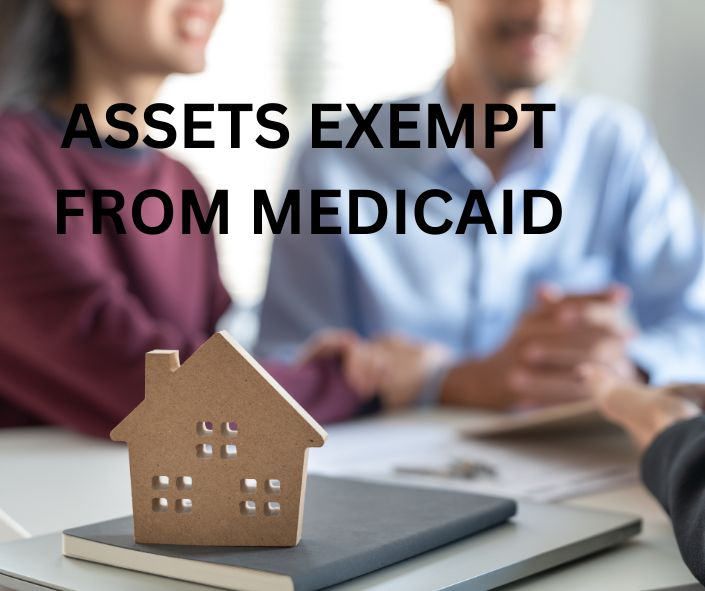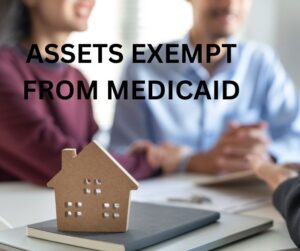Assets Exempt From Medicaid
Navigating the complexities of Medicaid eligibility in Texas can be a daunting task, especially when it comes to understanding which of your assets are exempt. Medicaid, a crucial program providing health coverage to millions of Americans, including elderly adults, has stringent asset limits for eligibility. This means that not all of your assets will count against you in the qualification process. In this blog post, we’ll delve into the specifics of exempt assets for Medicaid in Texas, providing you with the necessary information to better prepare for Medicaid planning.

List of Commonly Exempted Assets When Determining Medicaid Eligibility
Here’s a list of commonly exempt assets when determining eligibility for Medicaid, particularly for long-term care. It’s important to note that specific exemptions can vary by state, but generally, the following types of assets are often exempt:
- Primary Residence: The home you live in is usually exempt, provided it is your principal place of residence. There may be an equity limit on this exemption.
- One Vehicle: A single vehicle, which can be of any value, is typically exempt if it is used for transportation for you or a family member.
- Household Goods and Personal Effects: Furniture, appliances, jewelry, and clothing are usually exempt.
- Life Insurance Policies: Small life insurance policies with a limited cash value are often exempt. The specific cash value limit can vary by state.
- Burial Plots and Prepaid Funeral Plans: Burial plots for you and immediate family members, as well as certain prepaid funeral arrangements, are generally exempt.
- Property Used for Self-Support: Property that is essential for self-support, such as tools, equipment, or vehicles used for work, can be exempt.
- Special Needs Trusts: Assets in a special needs trust, set up for a disabled individual, are usually exempt.
- Irrevocable Funeral Trusts: In many states, funds set aside in an irrevocable funeral trust are exempt. See also…Medicaid Asset Protection Trusts.
- Certain Annuities: Some types of annuities may be exempt if they meet specific state and federal guidelines.
- Jointly Owned Property: Depending on the state and circumstances, some jointly owned property might not be counted.
- Retirement Accounts: In some states, retirement accounts like IRAs and 401(k)s may be exempt if they are in payout status.
- Income-Producing Real Estate: Real estate that generates income necessary for your support may be exempt.
Remember, Medicaid eligibility rules are complex and vary by state. It’s always advisable to consult with a Medicaid planning or elder law attorney in your state to understand the specific exemptions and rules that apply to your situation. They can provide guidance based on the most current laws and regulations.
Understanding Medicaid Asset Limits
In Texas, as in other states, Medicaid distinguishes between countable and exempt assets to determine eligibility for its programs, especially long-term care. Countable assets are those that could be converted to cash and used for your care, while exempt assets are not counted towards eligibility limits. For individuals, the countable asset limit is quite low, while it is slightly higher for married couples, especially when one spouse is not applying for Medicaid.
Action Step: Begin by reviewing your assets. Compare them with Texas Medicaid’s eligibility criteria to understand where you stand. This initial step is vital in planning for potential Medicaid needs.
What is the Maximum Income to Qualify for Medicaid in Texas?
Primary Residence
Your primary residence is often exempt from being counted as a Medicaid asset, subject to certain conditions. In Texas, your home will not count against your Medicaid asset limit if it is your principal place of residence and if your equity interest in the home is under a certain value. Additionally, the exemption applies if a spouse, a child under 21, or a blind or disabled child resides in the home.
Action Step: Evaluate the equity in your home and who resides there to determine if it meets the exemption criteria for Medicaid in Texas.
Personal Property and Household Belongings
Most personal property and household belongings are exempt from Medicaid’s asset count. This includes furniture, clothing, and other personal effects. These items are considered necessities and are not counted towards the asset limit.
Action Step: Identify your personal and household items, understanding that these are generally safe from affecting your Medicaid eligibility.
One Vehicle
Medicaid in Texas exempts one vehicle, regardless of its value. This vehicle can be used for transportation for you or a member of your family. This exemption is especially important as it allows you to maintain your transportation means without impacting your Medicaid eligibility.
Action Step: If you own more than one vehicle, determine which one should be designated as the exempt vehicle for Medicaid purposes.
Life Insurance and Burial Funds
Certain life insurance policies and burial funds are also exempt. In Texas, a life insurance policy with a face value of up to a certain amount is not counted. Similarly, designated burial funds of up to a specific value are exempt.
Action Step: Review your life insurance policies and any pre-paid burial plans you have. Make sure they align with the exemption limits set by Medicaid.
Other Exempt Assets

Action Step: Evaluate any additional assets you have, such as trusts or income-producing properties, to see if they fall into the exempt category.
The Importance of Legal Advice
Understanding which assets are exempt can be complex, and the rules can change. Therefore, it’s crucial to seek advice from a Medicaid planning or elder law attorney who can provide personalized guidance based on your specific situation.
Action Step: Schedule a consultation with a Medicaid planning attorney to discuss your assets and how they fit into the Medicaid eligibility criteria.
How Far Back Does Medicaid Look At Assets in Texas?
Summary
Knowing which assets are exempt is a key component of Medicaid planning in Texas. Your primary residence, personal property, a vehicle, certain life insurance policies, burial funds, and other specific assets can be exempt from Medicaid’s asset count. However, the nuances of these exemptions make it essential to review your assets carefully and seek professional legal advice. By taking these steps, you can better prepare for Medicaid eligibility and ensure that you are making informed decisions about your long-term care and financial well-being. See also…Protect Assets from Medicaid Recovery.
